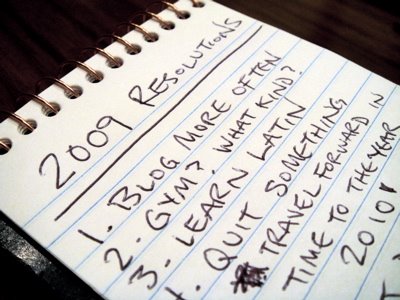New Year Resolutions That Work
Looking through the blogosphere and Twitter world, one thing that stands out is the fact that most bloggers and twitterers are at that age where they’re searching for their life purpose, which I believe is a lifelong process. Once you have an idea of who you want to be ‘when you grow up’, then the greatest question becomes, how do you move from where you are now, to the point you want to be?
The most popular tool is through making new year resolutions, most of which we don’t stick to. I had a privilege of getting 6 months of life coaching towards the end of last year, and I will share what I learnt and has worked well for me this year, at least in most aspects.
Towards the end of the year, the coach asked that I first come up with a life plan, then base my resolutions on certain pillars, all geared towards it’s achievement, and to keep doing this in subsequent years.
What is a life plan?
I think a life plan is a document or statement that defines your vision, mission and life objectives. It is used interchangeably with the word life purpose, though I find purpose more a spiritual statement of why you’re on earth, and probably wider than a life plan.
The three aspects of a life plan can be broken down as follows:
What is it you want to do with your life? If you believe in creation, why were you created. What is that thing you imagine you would want to do with your life, and what is it you want to be remembered for when you die?
Why do you want to be remembered for that particular thing? Unless you can define a reason, then the ‘what’ loses meaning. The reason behind a purpose gives passion, and follow through to actually accomplish.
How do you plan to go about achieving this? These steps should be very specific statements of things you intend to do to get to where you want to be, linking your future to the current.
The Annual Plan
Most of us tend to make stand alone new year resolutions, most popular being:
- Spend more time with family
- Fit in fitness
- Beat the bulge
- Quit smoking
- Enjoy life more / take a holiday
- Quit drinking
- Get out of debt
- Learn something new
- Help others
- Get organised
The problem with unstructured resolutions is, it’s not clear how they all contribute to your accomplishing your life plan. My coach taught that resolutions or annual plans as he called them should be based on the following 3 pillars, which together seek to fulfill all of a human beings existence needs:
1. Physical
This entails three areas; first, physical well being, which could cover aspects like keeping fit, healthy eating, dropping an addiction etc. Physical resolutions are often the most difficult and it’s recommended that you take them on, piecemeal. For example, instead of resolving to drop all junk food starting January 1st 2011, one could resolve to drop fries for the first 6 months, then soda for the next 6, and a couple of other meals in the following year.
One of the reasons why resolutions don’t work is the pressure to accomplish everything in one year. It’s better to take three years to quit or learn a new habit, than to fail every year for the rest of your life.
The second aspect of the physical pillar is social objectives. Social includes aspects such as spending time with family,working on current relationships, reviving dead ones and building new ones. Human beings are naturally relational and we tend to ignore relationships and hope they work on their own.
The third aspect is financial. Actions around this could be, join a SACCO if you buy into this kind of thinking, save Kshs XX in a separate account etc. One of the reasons why the resolution to save never works is most people want to see the whole 10 miles. If I am saving, what am I saving for? Where will I invest this money? And when they don’t see the entire road, they choose not to start walking. I say start by developing a saving habit, investment ideas will come along the way.
2. Mental Pillar
This pillar revolves around intellectual development. Aspects such as learning a new skill, reading a book a month would be good resolutions to make here. If one resolves to read a book a month, it helps to come up with the titles beforehand. Even if these change, it is more specific and easy to stay accountable when one has the spocific titles.
The second area of mental development is career. Most people are still in employment and there are things they would want to accomplish. As much as possible, the resolutions here should be about things within your control, but one might find that some things e.g job search aren’t within their control. In this case, it’s good to be very specific. If you’re looking to change jobs, there are pertinent questions that one should answer: Is there a chance of redeeming the job you have, are you escaping from a situation you could resolve or encounter in another work environment, or is the job change necessary for the achievement of your life plan?
For the self employed, this would include a business strategy, which is a whole life plan for your business.
3. Spiritual pillar
Just as human beings are relational, they’re spiritual, and have an innate need to leave something memorable here on earth when they die. Spiritual resolutions would be around your religion for the religious, or general spiritual health for the non religious. Away from religion, I think a resolution to switch off the ‘noise’ for 30 minutes a day to reflect would count as spiritual.
As relates to legacy. Every year, you should do one thing that contributes to your legacy. Most of us assume that we start building a legacy when we’re in our 40s or 50s, but what if you died today? If you want to leave a children’s home as your legacy, why not start help educating a less fortunate child now? A small contribution every year will eventually build up to a legacy.
Document your resolutions around those three pillars, then every quarter take time to review progress and pick up those that might have dropped off along the way, let me know if it works at the end of the year.






6 Comments